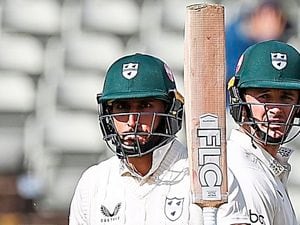Matt Maher: How Wolves fan Brian Mantle is going in to bat for German cricket
With the Bundesliga back in action, Germany is currently the focus of the sporting world.
But it is not only football fans who may soon be looking toward the country for their fix.
Within the next few weeks, cricket also hopes to resume and from his office in the city of Essen, it is a Shrewsbury-born Wolves fan responsible for plotting its return.
For the past nine years, Brian Mantle has been chief executive of the Deutscher Cricket Bund, during which time the sport has become an increasingly serious business.
“Cricket is the fastest growing sport in Germany, which is the fastest growing cricketing country in Europe,” explains Mantle.
“A decade ago I would have said most Germans wouldn’t have had a clue what cricket is and for many that might still be the case.
“But in the space of four years we have gone from 70 to 370 clubs and our infrastructure is growing all the time. We are certainly looking upwards, not downwards.”
With teams already allowed to practice in groups of up to 10 and restrictions expected to be further lifted in the coming weeks, Mantle – who emigrated in 1996 – is currently working on a plan which could see the national league resume next month.
Some of the matches could be broadcast over the internet via the European Cricket Network.
But while Germany’s efficient response in dealing with the coronavirus pandemic compared to other nations has allowed sport a quicker return, the need to maintain social distancing guidelines means that, for the time being, it won’t quite be cricket as we know it.
“The sport is certainly going to look a little different to normal, at least at first,” admits Mantle.
“You won’t be able to stand within five metres of another player, so slip fielding is straight away out of the question, while the wicketkeeper won’t be able to stand up to the stumps either.
“The umpires will also be required to stand further back from the stumps than normal, while fielders will have to keep their distance from the square leg umpire too.”
While the ball will be disinfected between each over using a cloth and all matches initially shortened to 20 overs per side, the key message sent out to players is to avoid sharing equipment, a particular headache in a country where cricket remains very much an amateur sport.
Mantle continued: “Players will be banned from using saliva to shine the ball. As long as they do that, then in the consultations we’ve had with virologists we were told the chances of passing on the virus while throwing the ball around are tiny.
“One thing we are experimenting with is whether using a disinfected cloth damages the ball in any way.
“The biggest danger we have identified is if people share helmets, particularly with spit going on to the grill.
“It is only when you start planning for something like this that you begin to realise what an unhygienic sport cricket can be.
“In the past players might have shared helmets or gloves. Now that simply cannot happen.”
It is just as well logistical conundrums are these days par for the course for Mantle, a former University of Wolverhampton student who claims to have achieved a childhood dream when he once lived in a flat overlooking Molineux. From an organisation which at one stage was run out of his spare room, the DCB now has three full-time staff members and the sport’s growth, prior to the coronavirus, had shown little sign of slowing down.
The increased popularity is chiefly down to immigration and the arrival in Germany of more than 180,000 Afghan refugees.
“Things changed very rapidly,” says Mantle. “Almost overnight we had a huge influx of people into the country, many of whom were fanatical about cricket.
“Things have grown very quickly all over Germany. Bavaria, for example, had just eight teams four years ago. Now there are 60.”
It is all a far cry from Mantle’s first experience of cricket in the country. A former player for Shrewsbury’s Quayside club, he didn’t even consider the prospect of playing the sport in Germany before tracking down a team in Dusseldorf.
“The pitch was artificial and in terrible shape,” he recalls. “I got bowled second ball from a delivery which didn’t leave the floor and my first impression was it was a waste of time.
“But my wife persuaded me to have another go and the conditions got better. It wasn’t long before I was running the local league. Since 2011, cricket has been my full-time job.”
While the domestic game has been in good health, Germany might also be about to become an increasing force on the international stage.
Stars of the national team include Izatullah Dawlatzai, an opening bowler who dismissed both Eoin Morgan and Jos Buttler while playing for Afghanistan at the 2012 World T20 tournament.
Dawlatzai now plays for Germany courtesy of an ICC ruling which meant players became eligible when they had lived in the country for three years, down from seven. The same legislation also made four players from England’s County Championship with German heritage available for selection – Glamorgan all-rounder Craig Meschede, Leicestershire fast bowler Dieter Klein, former Middlesex off-spinner Ollie Rayner and ex-Durham wicketkeeper Michael Richardson.
Their inclusion should make Germany, who just missed out on reaching the global qualifiers for this year’s T20 World Cup, a strong force in Associate cricket.
There have also been considerable strides made in the women’s game, where the national team sit even higher than the men’s in the global T20 rankings, while attracting a higher number of ethnic Germans in a sport which remains dominated by ex-pats.
“We are ambitious,” said Mantle. “The dream is to one day qualify for a World Cup and we believe that is realistic.
“Whether Germany would ever beat England in my lifetime is less sure. But I hope in a few years time we will be able to give them a decent contest.”





